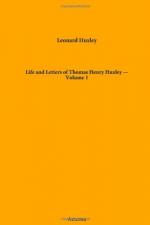|
This section contains 3,135 words (approx. 11 pages at 300 words per page) |

|
Thomas Henry Huxley, the biologist and the most versatile man of science of nineteenth-century England, was born at Ealing, near London. Like many eminent Victorians, Huxley was self-educated. While still an adolescent he read extensively in history and philosophy, learned several foreign languages, and began a medical apprenticeship. In 1842 he entered Charing Cross Hospital, where he distinguished himself by winning prizes in chemistry, anatomy, and physiology, and by publishing his first research paper. From 1846 to 1850 he was assistant surgeon on H.M.S. Rattlesnake while it conducted surveying operations in Australian waters. Huxley made capital out of this voyage, as Charles Darwin had done on the voyage of the Beagle, and sent home a number of scientific papers dealing with marine animals. These papers established his reputation as a first-rate biologist, and in 1851 he was elected a fellow of the Royal Society...
|
This section contains 3,135 words (approx. 11 pages at 300 words per page) |

|


